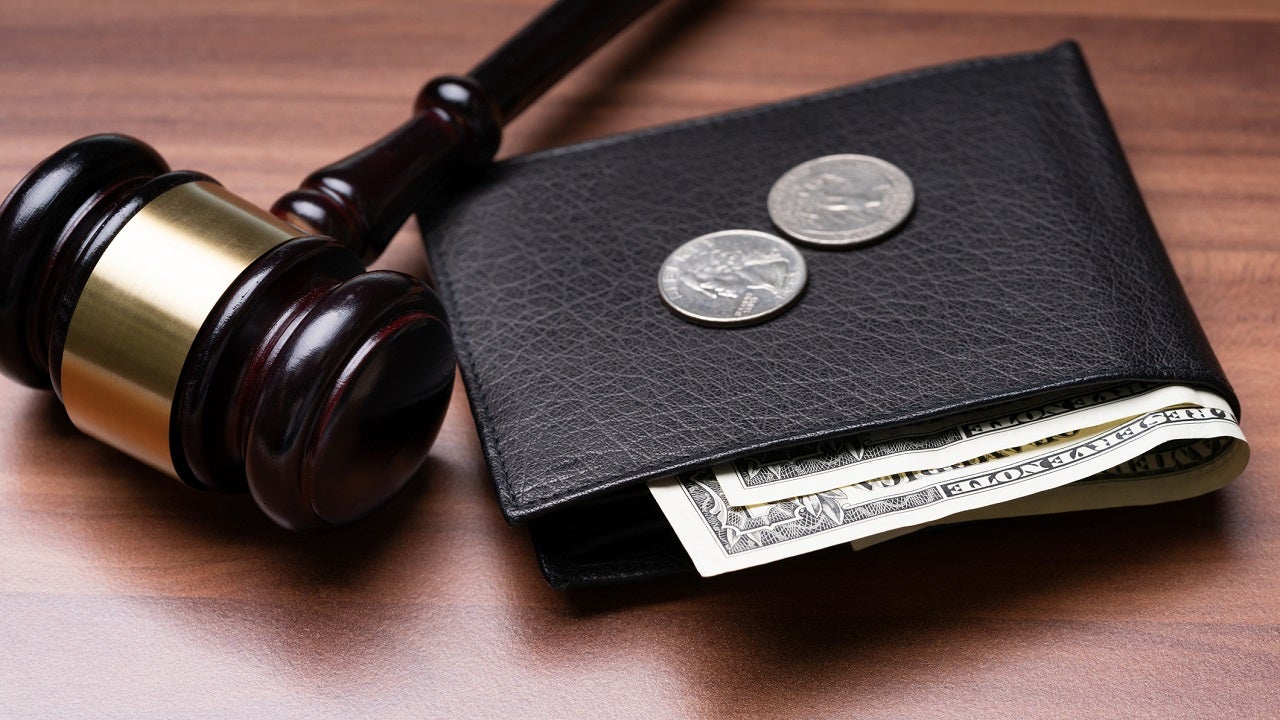Can credit card companies garnish wages?

Key takeaways
- Wage garnishment is a potential consequence of not paying credit card debt, where part of each paycheck is taken to pay off the debt.
- Federal law limits the amount that can be garnished from each paycheck, but some states have stricter limitations.
- To avoid wage garnishment, reach out to your credit card issuer and seek help if you need it.
According to Bankrate’s Credit Card Debt Survey, nearly half of all credit cardholders carry debt from month to month, with inflation and high interest rates being key factors.
Paying down credit card debt is important to avoid high interest charges that come with carrying a balance. But the importance doesn’t stop there: If you stop paying or fall behind on your credit cards, you could get sued — which may result in your wages being garnished to pay off your debt. That means a portion of each paycheck would be automatically taken from you.
There are a few ways to avoid wage garnishment. If you can make the minimum payments on your credit cards, for example, your account will remain in good standing. If you are unable to make those minimum payments, you can contact your credit card issuer and request to be considered for a hardship program.
Here’s what you need to know about wage garnishment, including how to avoid it and how to protect yourself.
What is wage garnishment?
Wage garnishment is one of the final steps in the debt collection process. If you cannot pay your debts, your creditor could begin the debt collection process by sending you reminders about missed payments. You might also get charged late fees or see your interest rate increase — and if you continue to miss payments, your credit score is likely to drop.
If your debt continues to go unpaid, your creditor will send your debt to a collection agency. Debt collectors have a limited amount of time in which to collect an old debt, so they’ll begin by calling you (often repeatedly) and may decide to sue you for nonpayment. If the lawsuit proceeds and a court rules in the debt collector’s favor, your wages can be garnished.
With wage garnishment, a certain amount of every paycheck goes directly to the debt collector until your debt is paid in full. Your employer’s payroll department will have to deduct the money from your paycheck, which means your employer will be aware that you haven’t paid off your debts. According to the Consumer Credit Protection Act, your employer cannot fire you if your wages are being garnished for a single debt — but that protection disappears if your wages are being garnished for multiple debts.
Some state and federal benefits — including Social Security, Supplemental Security Income (SSI) and Veterans Affairs (VA) benefits — are protected from garnishment by creditors.
Can my wages be garnished for credit card debt?
Yes, your wages can be garnished over an unpaid credit card debt — especially if the debt ends up going to collections. Although many people associate wage garnishment with unpaid child support, defaulted student loans or back taxes, courts can also order your wages to be garnished over an outstanding credit card debt. Wages can even be garnished over a joint credit card debt, such as a credit card shared with a partner or spouse.
What are the wage garnishment limitations?
Federal law limits the amount of money that can be garnished from each paycheck. For ordinary garnishments, creditors may not take more than either 25 percent of your income (after taxes and qualifying deductions have been removed) or the amount by which your income is greater than 30 times the federal minimum wage (currently $7.25/hr), whichever is lower. In some cases, your wages may be too low to be legally garnished.
If the pay period is weekly and disposable earnings are $217.50 ($7.25 × 30) or less, there can be no garnishment. If disposable earnings are more than $217.50 but less than $290 ($7.25 × 40), the amount above $217.50 can be garnished. If disposable earnings are $290 or more, a maximum of 25 percent can be garnished.
“When pay periods cover more than one week, multiples of the weekly restrictions must be used to calculate the maximum amounts that may be garnished,” as stated on the U.S. Department of Labor’s website. For example, if you’re paid every 2 weeks, the first $435 of your check is exempt.
Some states have stricter wage garnishment limitations than the federal limits, meaning that creditors are allowed to garnish even less of each paycheck.
If you file for bankruptcy, creditors and debt collectors may not garnish your wages — though you may have to notify your creditors and employer.
Example of how wage garnishment works
If you are behind on your debt and a court orders your wages to be garnished for repayment, the process is pretty straight forward. Each time your employer pays you, they are required to withhold a certain percentage of your paycheck to be used for debt repayment. That repayment is then made directly to your creditor by your employer or their payroll company.
The amount of money withheld from your paycheck is based on the amount of money you earn each week. Federal regulations limit the maximum amount that can be withheld to either 25 percent of your income (after taxes and qualifying deductions) or the amount of disposable earnings that are greater than 30 times the federal minimum wage, whichever is less. As mentioned earlier, certain states enforce even stricter limitations.
For example, let’s assume you are paid weekly, making disposable earnings of $600 a week. Since you make more than 30 times the federal minimum wage ($7.25 x 30= $217.50), your wages would be subject to garnishment.
However, the maximum amount that could be garnished from your wages is 25 percent of your disposable earnings, or $150 per week ($600 x 0.25 = $150). That money would be withheld from your paycheck and paid directly to your creditor by your employer (or their payroll company).
How to protect yourself from wage garnishment
If your credit card debt has already been sent to collections, there are steps you can take to protect yourself from wage garnishment.
- Discuss debt forgiveness options with the collection company. The collection agency might reduce your total debt if you’re able to make a lump sum payment on the remaining balance.
- Don’t ignore notices. If your debt is at the point where collection agencies are sending you letters about a potential lawsuit, see if you can work out an agreement instead of going to court.
- Go to court if summoned. If you end up getting sued over old debt, don’t ignore the summons. If you fail to appear in court, your debt collector will automatically win the suit. So show up, dress professionally and be prepared to defend yourself.
Remember that each state has a statute of limitations on debt, and your debt collector may be suing you over a debt that it no longer has the right to collect. You may even want to talk to a lawyer about your rights and options. Lawyers aren’t free, but they can be more affordable than a wage garnishment.
What to do if you can’t pay your credit card bills
If you’re unable to pay your credit card bills, your first step should be to contact your credit card issuer and see if you can negotiate a lower monthly payment or a lower interest rate. You might also want to ask about credit card forbearance options, which allow you to put off making payments for a few months without any damage to your credit score.
If you need additional help, consider contacting a reputable nonprofit credit counseling service. These organizations work with you to make a financial plan to keep up with your debt payments, and they can also provide insight into debt relief options like debt consolidation.
The bottom line
Wage garnishment is a serious consequence of unpaid credit card debt, but there are steps you can take to protect yourself and avoid it. From negotiating with the card issuer to seeking help from credit counseling services, there are options available to help you manage your debt.
Taking action now can save you from the stress and financial burden of wage garnishment in the future. Take control of your credit card debt today and make a plan to become debt-free.
To learn more about how to manage and pay off credit card debt, visit Bankrate’s credit card debt resource site.
Why we ask for feedback Your feedback helps us improve our content and services. It takes less than a minute to complete.
Your responses are anonymous and will only be used for improving our website.






